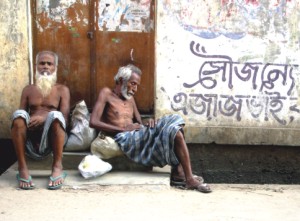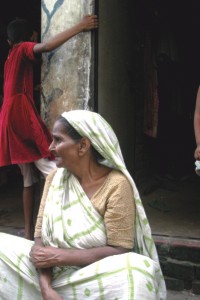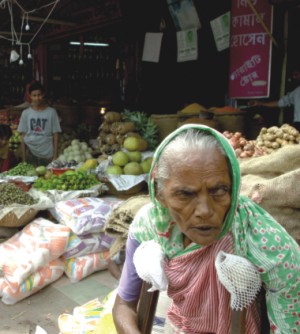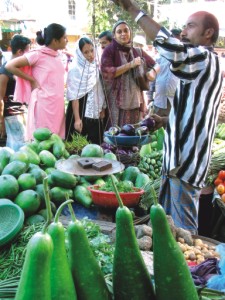|
Special Feature
Life Lost in Living
With the prices of essentials skyrocketing and the government playing a pococurante bystander, how are general people coping with life?
Ahmede Hussain
It is three in the morning in downtown Dhaka. Under the glitzy billboard of the World's Local Bank, enunciating the London-based financial institution's years-old expertise in handling its client's money, Honufa, a 65-year-old beggar, makes her bed on the pavement. She gives conflicting facts regarding her actual age; Kariman, a fellow-beggar who sleeps on the same pavement, believes Honufa was born during the heydays of the  Raj. Honufa is not sure though; with the advent of old-age complications, she has even forgotten how she lost her left limb: it was while descending a train, Honufa says, squinting her eyes, groping down memory lane. At times she blames it on her dead-husband, who, given the faintest excuse, used to beat her up. People like Honufa and Kariman, who constitute the majority of the city's populace, have been hit hard by the recent price-hike of oil, which for its turn, have made the prices of essentials far beyond the grasp of many. Raj. Honufa is not sure though; with the advent of old-age complications, she has even forgotten how she lost her left limb: it was while descending a train, Honufa says, squinting her eyes, groping down memory lane. At times she blames it on her dead-husband, who, given the faintest excuse, used to beat her up. People like Honufa and Kariman, who constitute the majority of the city's populace, have been hit hard by the recent price-hike of oil, which for its turn, have made the prices of essentials far beyond the grasp of many.
For their dinner, both the women had had a handful of puffed-rice and half a bottle of mineral water that Kariman picked up from the wayside garbage. A week ago, when the nearby makeshift restaurant offered a meal of a plate of rice and bhaji for Tk 8, both of them could afford a decent dinner. With the prices of rice, kerosene, vegetables and pulses going up, the restaurant that they frequented to, has closed down. The restaurateur, a wiry man in his late twenties, is planning to change business. "The Ramadan is breathing down our neck and I do not think the market will calm down soon," Haroun says, sitting on the footpath where his hotel used to stand. "I had to bribe the police every month," he says; now he does not have savings for a rainy day.
"I have only Tk 200 left, by the end of the month which will go on house rent," Haroun says. The balance sheet of the youth's life cannot get clearer, for a roaring Lexus passes by; beams of red, green and yellow pour from the nearest MasterCard-Visa signboard and Haroun's face, sad and ironic, glistens for a while.
 In a city where some spend thousands on designer clothes, Honufa and Kariman, hungry and haggard, meanwhile, try to get some sleep before another cruel dawn descend on them. In a city where some spend thousands on designer clothes, Honufa and Kariman, hungry and haggard, meanwhile, try to get some sleep before another cruel dawn descend on them.
People who live on a shoestring budget - members of the middle class - are finding it increasingly difficult to keep the body and soul together. Taslima Akhtar lives in Mirpur and with the meager income of her schoolteacher husband runs a family of four. "Najir Shai used to be sold at Tk 19 a kilogram a year ago, now its Tk 28 per kg," she says. Not only the price of rice, prices of pulses, sugar and milk have increased by 20 percent within a week. Even baby-food has not been not spared: "One of the popular powered-milk brand has raised its price by almost 200 Taka," Taslima says.
Traders blame it on the increasing fuel-price. "Earlier I would spend around Tk 10,000 to bring a truckload of onions from Pabna to Dhaka. It has now jumped to Tk 12,000," a trader in Karwan Bazaar says.
And with Ramadan in the offing, one is not sure when this helical trend on the market will relent. Speculations are ripe among grocers that prices will roll on further. This reasoning, driven by a pervasive consumerism, has resulted in mass hoarding.
Vegetable traders across the city, sensing a bullish trend in the market, have hiked the prices of goods they sell. So, though like their demand, the supply of vegetables has  remained constant, common vegetables like aubergine (Begun), okra (Dharosh), turnip (Mula), bitter root (Ol Kochu), bottle gourd (Jali Kumra), green bean (Borboti) or radish (Shal Gom) sting if one ventures into buying them. remained constant, common vegetables like aubergine (Begun), okra (Dharosh), turnip (Mula), bitter root (Ol Kochu), bottle gourd (Jali Kumra), green bean (Borboti) or radish (Shal Gom) sting if one ventures into buying them.
Price hike of essentials, it seems, has become a taboo subject for our politicians. Finance Ministry claims to have tightly-griped the wild-horse of inflation, the Finance Minister (FM) thinks the country's economy is in full employment, but along with witnessing these bombast - characteristic of BNP Ministers - we come across abject poverty and sheer employment. One, who has a shred of intelligence left in the brain, would not make such irresponsible comments, not one who happens to be in charge of the exchequer. Full employment, in economic terms, is a situation where only 4 percent of the total workforce are unemployed. If what M Saifur Rahman says is true then we have to believe that, as far as full employment is concerned, we live in a country where everyone seeking work readily finds it.
As a student of Economics Rahman should know that full employment is a utopia that most of the developed countries have not been able to achieved. It is no surprise then, when prices of essentials are going up, the FM would claim normalcy. With an FM like him we hardly need anyone else to botch things up.
Apart from the ruling BNP, the main opposition Awami League (AL) and its Left partners have remained indifferent to the ever-ascending market. Last Sunday Communist Party of  Bangladesh (CPB) has called a countrywide dawn to dusk strike to protest, among other things, the price-hike of oil. The strike, besides falling flat to shut down the country, has failed to make the point. The only case, if there is any, that has been proven is how the CPB's strength has dwindled from a burgeoning 'second force' to an object of pity. It is sad that the party could not enforce a strike it had so stubbornly called. Bangladesh (CPB) has called a countrywide dawn to dusk strike to protest, among other things, the price-hike of oil. The strike, besides falling flat to shut down the country, has failed to make the point. The only case, if there is any, that has been proven is how the CPB's strength has dwindled from a burgeoning 'second force' to an object of pity. It is sad that the party could not enforce a strike it had so stubbornly called.
The AL, on the other hand, is acting like an old pet that does not want to learn new tricks. Whenever it is in the opposition, the party faces, what it looks like, an age-old paradox: What to do with the parliament. So, instead of using the parliament as a platform to shed light on the BNP's corruption and misrule, the AL, time and again, has resorted to Martial-law-era tools like street-agitation and strike.
It is indeed true that the AL, in most of the times, is not given a proper chance to speak in the floor. But over the years as the main opposition the AL has developed a strange relationship with the parliament, where the party does not want to go to in the first place.
As an opposition, it can be fairly said that, the AL has been a failure. So does the BNP as the ruling party. It has lately declared two days of weekly holiday; the reason given for this is rising price of oil on the international market. The irony does not escape us: Instead of reigning in the price spiral, the government wants citizens to stay home. What they will eat, it does not care. Copyright
(R) thedailystar.net 2005 |
